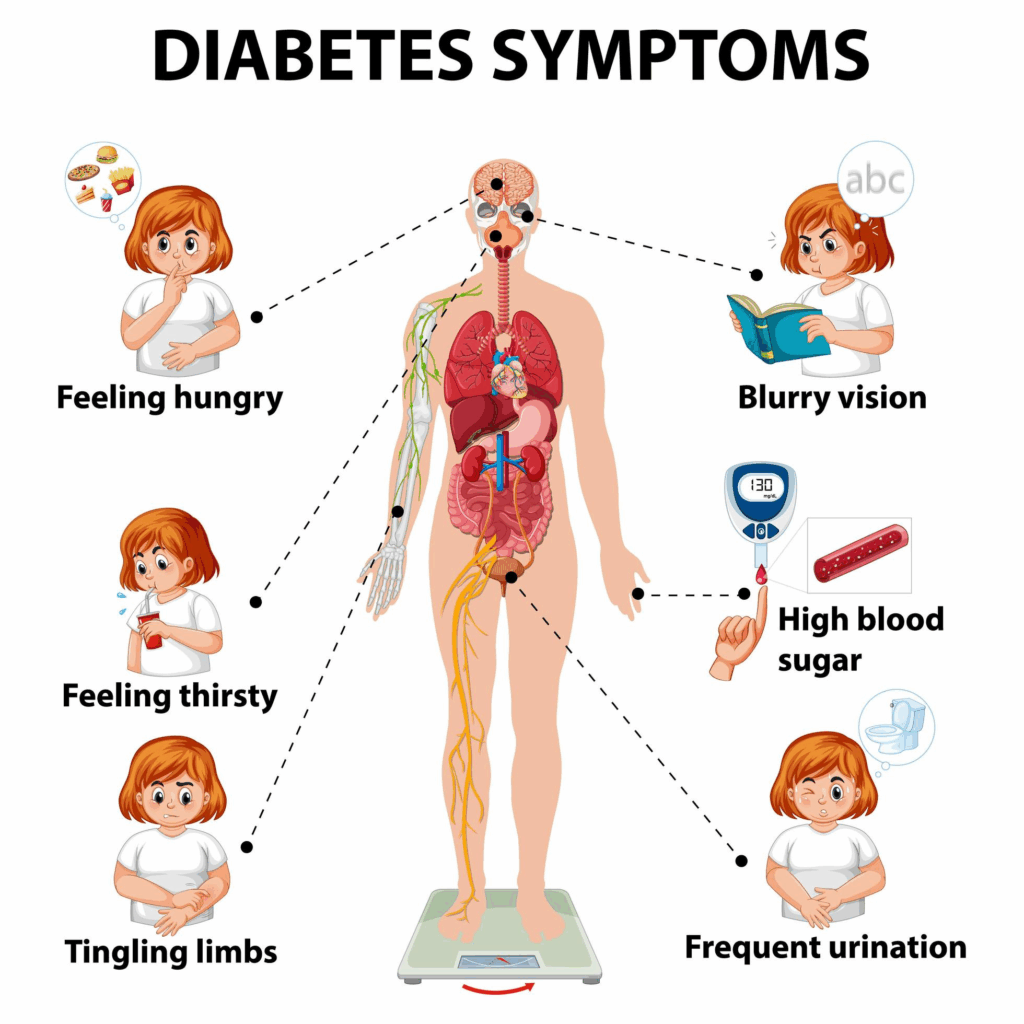Diabetes is a chronic medical condition that affects how your body uses blood sugar (glucose). Glucose is an essential source of energy for your cells, but when you have diabetes, your body either doesn’t produce enough insulin or can’t use insulin properly. This leads to high blood sugar levels, which can cause serious health issues over time.
Types of Diabetes
There are primarily three types of diabetes: Type 1, Type 2, and gestational diabetes. Each type has different causes, risk factors, and treatment methods.
- Type 1 Diabetes: An autoimmune condition where the body’s immune system attacks the insulin-producing cells in the pancreas, leading to little or no insulin production.
- Type 2 Diabetes: A condition where the body becomes resistant to insulin, or the pancreas can’t produce enough insulin to maintain normal blood sugar levels. This type is more common and is closely linked to lifestyle factors.
- Gestational Diabetes: Develops during pregnancy and usually disappears after childbirth, but it increases the risk of developing Type 2 diabetes later in life.
Symptoms of Diabetes
The symptoms of diabetes can vary depending on the type, but common signs include:
- Increased thirst and urination
- Unexplained weight loss
- Blurred vision
- Slow-healing cuts or sores
- Fatigue
- Increased hunger

If you experience any of these symptoms, it’s important to consult a healthcare provider for proper testing and diagnosis.
Causes and Risk Factors
While the exact cause of diabetes can vary based on the type, several common factors contribute to its development:
- Genetics: Family history plays a role in increasing your risk, especially for Type 2 and Type 1 diabetes.
- Lifestyle: Poor diet, lack of physical activity, and being overweight are major risk factors for Type 2 diabetes.
- Age: The risk of Type 2 diabetes increases with age, particularly after 45.
- Pregnancy: Women who develop gestational diabetes during pregnancy are at a higher risk of developing Type 2 diabetes later in life.
Diagnosis and Testing
Diabetes can be diagnosed through several tests that measure blood sugar levels:
- Fasting Blood Sugar Test: Measures your blood sugar after fasting for at least 8 hours.
- Oral Glucose Tolerance Test: Measures blood sugar levels before and after drinking a sugary solution.
- Hemoglobin A1c Test: Reflects your average blood sugar levels over the past 2 to 3 months.
Treatment and Management
While there is no cure for diabetes, it can be managed effectively through a combination of lifestyle changes, medication, and monitoring. Treatment depends on the type and severity of diabetes:
- Type 1 Diabetes: Requires insulin therapy and regular blood sugar monitoring.
- Type 2 Diabetes: Often managed with lifestyle changes, oral medications, and sometimes insulin.
- Gestational Diabetes: Managed with diet and exercise, and insulin may be needed in some cases.
Prevention
For those at risk of Type 2 diabetes, lifestyle changes are the most effective prevention methods. Maintaining a healthy weight, eating a balanced diet, and exercising regularly can help prevent or delay the onset of Type 2 diabetes.
Conclusion
Diabetes is a serious but manageable condition. Early diagnosis, a healthy lifestyle, and proper medical care can help individuals with diabetes lead a long and healthy life. If you suspect you have diabetes or are at risk, it’s important to seek medical advice for diagnosis and treatment.
Also Read : Effective Coping Techniques for Anxiety



